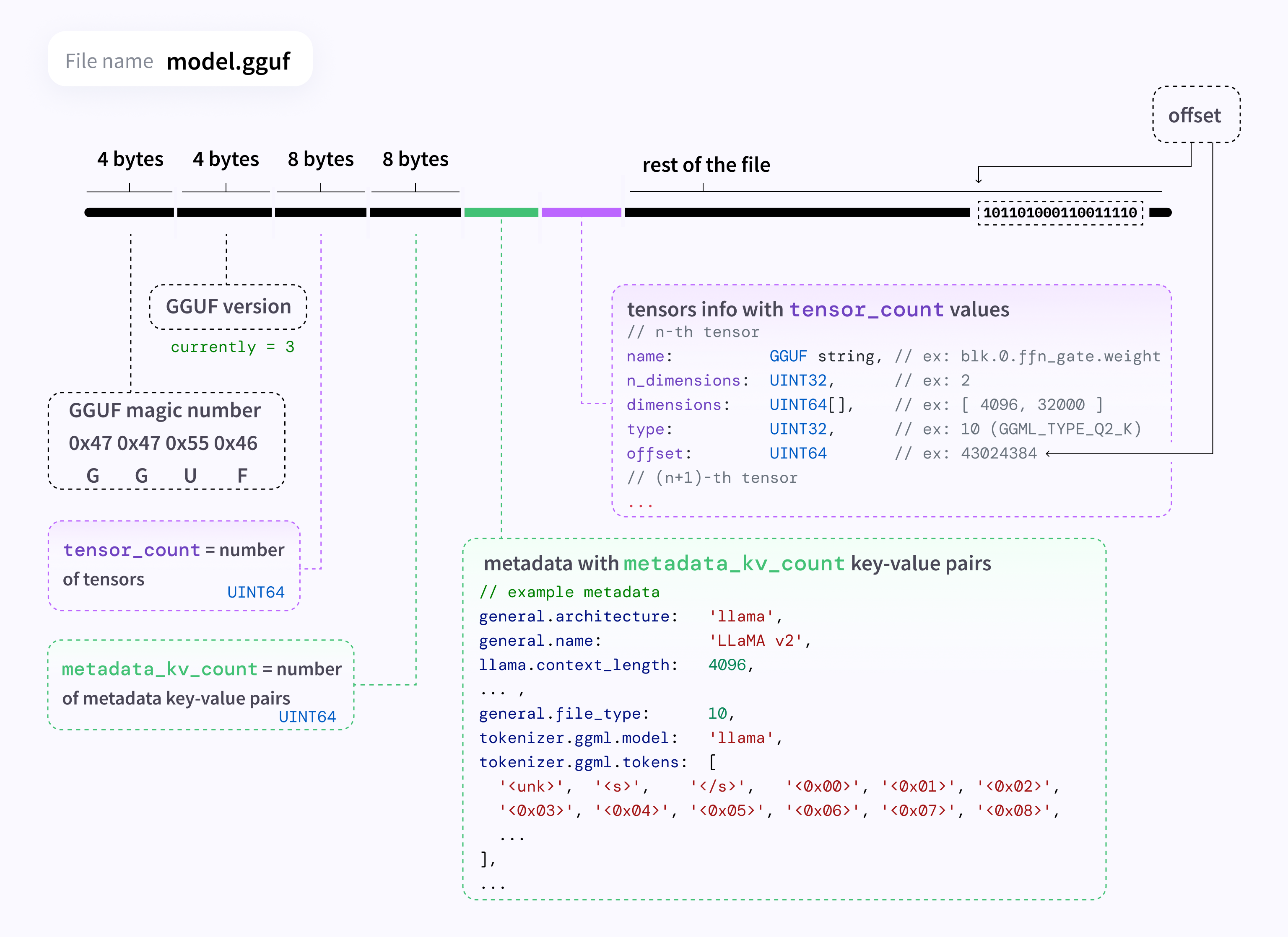
Research
/Security News
Weaponizing Discord for Command and Control Across npm, PyPI, and RubyGems.org
Socket researchers uncover how threat actors weaponize Discord across the npm, PyPI, and RubyGems ecosystems to exfiltrate sensitive data.
@huggingface/gguf
Advanced tools
@huggingface/ggufA GGUF parser that works on remotely hosted files.

Spec: https://github.com/ggerganov/ggml/blob/master/docs/gguf.md
Reference implementation (Python): https://github.com/ggerganov/llama.cpp/blob/master/gguf-py/gguf/gguf_reader.py
npm install @huggingface/gguf
import { GGMLQuantizationType, gguf } from "@huggingface/gguf";
// remote GGUF file from https://huggingface.co/TheBloke/Llama-2-7B-Chat-GGUF
const URL_LLAMA = "https://huggingface.co/TheBloke/Llama-2-7B-Chat-GGUF/resolve/191239b/llama-2-7b-chat.Q2_K.gguf";
const { metadata, tensorInfos } = await gguf(URL_LLAMA);
console.log(metadata);
// {
// version: 2,
// tensor_count: 291n,
// kv_count: 19n,
// "general.architecture": "llama",
// "general.file_type": 10,
// "general.name": "LLaMA v2",
// ...
// }
console.log(tensorInfos);
// [
// {
// name: "token_embd.weight",
// shape: [4096n, 32000n],
// dtype: GGMLQuantizationType.Q2_K,
// },
// ... ,
// {
// name: "output_norm.weight",
// shape: [4096n],
// dtype: GGMLQuantizationType.F32,
// }
// ]
// Reading a local file. (Not supported on browser)
const { metadata, tensorInfos } = await gguf(
'./my_model.gguf',
{ allowLocalFile: true },
);
By default, known fields in metadata are typed. This includes various fields found in llama.cpp, whisper.cpp and ggml.
const { metadata, tensorInfos } = await gguf(URL_MODEL);
// Type check for model architecture at runtime
if (metadata["general.architecture"] === "llama") {
// "llama.attention.head_count" is a valid key for llama architecture, this is typed as a number
console.log(model["llama.attention.head_count"]);
// "mamba.ssm.conv_kernel" is an invalid key, because it requires model architecture to be mamba
console.log(model["mamba.ssm.conv_kernel"]); // error
}
Because GGUF format can be used to store tensors, we can technically use it for other usages. For example, storing control vectors, lora weights, etc.
In case you want to use your own GGUF metadata structure, you can disable strict typing by casting the parse output to GGUFParseOutput<{ strict: false }>:
const { metadata, tensorInfos }: GGUFParseOutput<{ strict: false }> = await gguf(URL_LLAMA);
This package provides a CLI equivalent to gguf_dump.py script. You can dump GGUF metadata and list of tensors using this command:
npx @huggingface/gguf my_model.gguf
# or, with a remote GGUF file:
# npx @huggingface/gguf https://huggingface.co/bartowski/Llama-3.2-1B-Instruct-GGUF/resolve/main/Llama-3.2-1B-Instruct-Q4_K_M.gguf
Example for the output:
* Dumping 36 key/value pair(s)
Idx | Count | Value
----|--------|----------------------------------------------------------------------------------
1 | 1 | version = 3
2 | 1 | tensor_count = 292
3 | 1 | kv_count = 33
4 | 1 | general.architecture = "llama"
5 | 1 | general.type = "model"
6 | 1 | general.name = "Meta Llama 3.1 8B Instruct"
7 | 1 | general.finetune = "Instruct"
8 | 1 | general.basename = "Meta-Llama-3.1"
[truncated]
* Dumping 292 tensor(s)
Idx | Num Elements | Shape | Data Type | Name
----|--------------|--------------------------------|-----------|--------------------------
1 | 64 | 64, 1, 1, 1 | F32 | rope_freqs.weight
2 | 525336576 | 4096, 128256, 1, 1 | Q4_K | token_embd.weight
3 | 4096 | 4096, 1, 1, 1 | F32 | blk.0.attn_norm.weight
4 | 58720256 | 14336, 4096, 1, 1 | Q6_K | blk.0.ffn_down.weight
[truncated]
Alternatively, you can install this package as global, which will provide the gguf-view command:
npm i -g @huggingface/gguf
gguf-view my_model.gguf
The Hub supports all file formats and has built-in features for GGUF format.
Find more information at: http://hf.co/docs/hub/gguf.
🔥❤️
FAQs
a GGUF parser that works on remotely hosted files
We found that @huggingface/gguf demonstrated a healthy version release cadence and project activity because the last version was released less than a year ago. It has 5 open source maintainers collaborating on the project.
Did you know?

Socket for GitHub automatically highlights issues in each pull request and monitors the health of all your open source dependencies. Discover the contents of your packages and block harmful activity before you install or update your dependencies.

Research
/Security News
Socket researchers uncover how threat actors weaponize Discord across the npm, PyPI, and RubyGems ecosystems to exfiltrate sensitive data.

Security News
Socket now integrates with Bun 1.3’s Security Scanner API to block risky packages at install time and enforce your organization’s policies in local dev and CI.

Research
The Socket Threat Research Team is tracking weekly intrusions into the npm registry that follow a repeatable adversarial playbook used by North Korean state-sponsored actors.